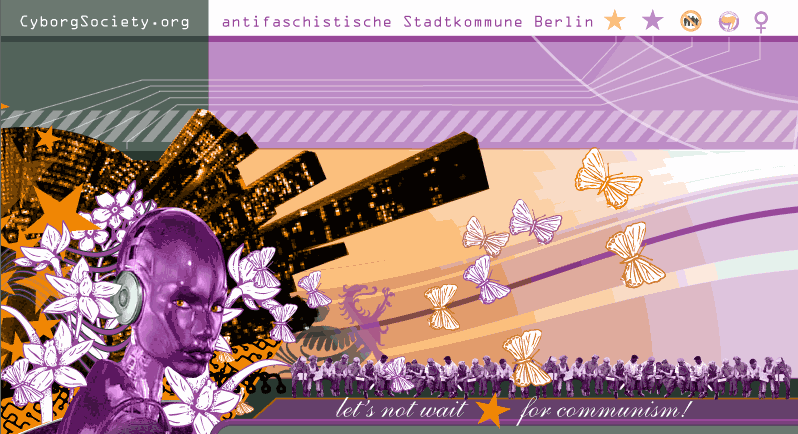About Cyborg
Cyborgs
"This essay is a plea to enjoy the blur of boundaries and to take responsibility for its (cyborg's) construction."
The reference to cyborgs on this page relates to Donna Haraway's "Cyborg Manifesto", respectively "A Cyborg Manifesto: Science, Technology, and Socialist-Feminism
in the Late Twentieth Century" from the book The Reinvention of Nature.
It is impossible to determine precisely what cyborgs are. On the one hand they serve as a metaphor to describe the current situation in which the discursive production of global networking has become a tangible force upon the individual (the informatics of dominance), on the other hand they serve as a SciFi utopia to overcome the circumstances, the society constituted by the divisions outlined below.
By the way, it is not necessary to understand this text to participate in the commune...
Nice, you have got the technology to network with us by computer and hence can read this text. We all are a wee bit Cyborg ;-) [translator's remark: german punchline].
Although repeating myself later on, I will present a central piece of text in the beginning, before you will get flooded by loads of details: the cyborg defines
a technological polis based partly on a revolution of social relations in
the oikos, the household. (a link between commune and cyborgs is still missing, namely the ideas about organisation (networking) and economy; will follow shortly.)
Donna Haraway defines Cyborgs as creatures without origin.
Cyborgs do not distinguish between mankind and nature. In this context it is important to read mankind as a description for men in public space and nature for womyn in private space. Once again: Cyborgs do not distinguish between mankind and nature.
They consider nature to be a societal circumstance. Cyborgs are hybrid chimares, internalised crossing of boundaries. Hence they refuse oedipal dreams of a community within a protective, organic family. Although cyborgs derive from the military-industrial complex, they have got not origin in western sense. They are fragmented and interleaved identities, free of any innocence and not structured by the dualism of public and private. Cyborgs are a composition of the organic, technical, mythical, textual and political ... (Haraway, or others)
Haraway tries to find a way out of the usual role allocations by the construction of cyborgs, not by proclaiming another unity, but by creating a model of complex, superimposed identities which substantially leaves more room for differences than western stories and traditional marxist theories permit. "The cyborg is a creature in a post-gender world; it has no truck with
bisexuality, pre-oedipal symbiosis, unalienated labour, or other seductions
to organic wholeness through a final appropriation of all the powers of
the parts into a higher unity. The cyborg is resolutely committed to partiality, irony, intimacy, and
perversity. It is oppositional, utopian, and completely without innocence.
No longer structured by the polarity of public and private, the cyborg defines
a technological polis based partly on a revolution of social relations in
the oikos, the household." "Cyborgs have no respect." [...] She deems the statement of innocence out of which the revolutionary subject is constructed as one of the most important errors of marxism, e.g. the proletarian who was assumed to be on the right/good side, because he is a fair worker and is exploited by evil, heartless capitalists. Simultaneously, she speaks out against the ontologising depiction of womyn which wants to construct womyn as a class and assume the good per se in her, because womyn are naturally ... Exatly this nature (and the role allocation woman/nature) is wiped away by Haraway and instead she invents cyborgs with an ironic tongue in cheek.
So what is the link to the project?
Briefly: The economic boundaries between you and me are blurred in a communal economoy, hence there is no seperated economy of political groups and no seperated private survival. It is not possibly anymore, to work "for yourself"
or "for political issues". How public and private develop in an emancipative movement is written in the paper "The Time Machine".
"There shall be no unity, no overarching community, the collective's character shall develop out of the sum of the individual parts and their coaction. No interest shall be curtailed by abstraction of a general. Differences shall remain and hence be reason for negotiation and interaction, instead of being settled in central arenas (e.g. plena) in a "bloody fight" for legitimacy. "We" are not keen on building some (real electronic) circuits into our bodies - on the other hand theory, knowledge and communication are likewise technology which is built-in and which we want to "tinker" with. It structures our actions, therefore we want to structure it. Nothing is natural. In computerised networks we see the possibility to organise power/influence/communication/organisation/planning decentralised and hence individually without elite, without developing a programme of unity. This is no plea for multi-culti or pluralism.
Emancipation is a consequence of capabilities and possibilities and hence is not solvable by politics. An apolitical concept of emancipation is conceivable. The bourgeois (commodified) subject is a dazzlement which foils the real coercion and involvement in the existing circumstances. Members of a communal economy disband from this illusoriness and are either subject or object reciprocally or dissolve these categories completely. A nightmare for bourgeois ideologists, because the goal is not freedom and equality, but to potentise our possibilites through a collective economy, to emancipate from the circumstances; solidly through common economy instead of political unity. Consent is good if it has developed, if conviction is gained through knowledge, but is bad if it is enforced to be the only basis for action.
Incidentally, it is a consequence of this approach that these pages are not representative of the other participants. They are part of the internal discussion to which we call for participation, especially in case of differences (albeit the emancipative basic consent is prerequisite). |

